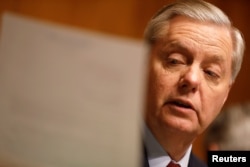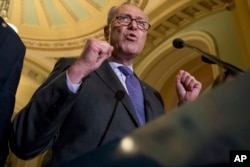Attorney General Jeff Sessions has made clear that he has no plans to resign in the face of harsh criticism from President Donald Trump, but he is said to be considering action that could ease the president's displeasure.
Trump kept up pressure Wednesday on Sessions. In a two-part Twitter post, he asked why the attorney general had not replaced acting FBI director Andrew McCabe, whose wife received a large campaign donation from Democrats last year when she ran for political office in Virginia.
Trump had expressed disappointment in Sessions earlier this week, though White House Press Secretary Sarah Huckabee Sanders said Wednesday that doesn't necessarily mean he wants the attorney general to resign. "You can be disappointed in someone but still want them to continue to do their job," she told the daily White House briefing.
Watch: Attorney General, Under Fire From Trump, Could Launch Intel Leak Probe to Appease President
However, when asked whether the president has confidence in Sessions, Sanders was noncommittal. "The president wants the attorney general to focus on his duties as attorney general," she replied.
Trump's Twitter blast at McCabe this week is seen as part of his attempt to thwart special counsel Robert Mueller's Russia probe, which has been expanded to include possible White House involvement with Kremlin agents in attempting to influence last year's presidential election. As acting FBI director, McCabe effectively oversees the Mueller investigation.
White House Communications Director Anthony Scaramucci said Wednesday that Sessions soon would launch a Justice Department investigation into the government leaks of sensitive information that have annoyed and distracted Trump throughout his presidency.
"I think he [Sessions] has got a plan that he's put together, and at some point, I don't know if it will be today, tomorrow or next week, he will announce that plan," Scaramucci told Fox News. "We have to crack down on leaks on a number of different fronts."
The Washington Post first reported that the leak investigations are in the works.
Such investigations undoubtedly would be good news to Trump, answering one of his longstanding concerns about leaks that have appeared in major U.S. newspapers, sometimes contradicting the official version of events offered by administration officials.
News of the pending investigations came hours after the president tweeted his displeasure with Sessions' lack of action on the probes.
A senior Republican senator, Bob Corker of Tennessee, said Wednesday the president appears not to want to fire Sessions, a loyalist who was the first senator to back Trump's candidacy. "I think they [Trump's advisers] understand that [firing Sessions is] problematic, highly problematic," Corker said. "But I do think it's evident that the president is making it difficult for secretary — um, Attorney General Sessions. I think it's something Jeff has got to decide."
Another prominent Republican, Senator Lindsay Graham, told CNN on Wednesday that Trump's attacks on Sessions amount to a show of weakness. "The weakness is that the president is trying not to use his powers. He's trying to get Sessions to quit," Graham said. "And I hope Sessions doesn't quit, and if the president wants to fire him, fire him."
Senate minority leader Chuck Schumer, who has maintained a steady stream of withering criticisms of Trump, said Wednesday the president's tweets against Sessions had gone "far beyond the dangers of a chilling effect" at the Department of Justice. He said Americans should wonder why Trump is "publicly, demeaning and humiliating such a close friend, supporter and member of his Cabinet."
"They should wonder if the president is trying to pry open the Office of Attorney General to appoint someone during the August recess who will fire Special Counsel Mueller and shut down the Republican investigation," Schumer said. "Let me say, if such a situation arises, Democrats will use every tool in our toolbox to stymie such a recess appointment."
Trump has told aides for months — and in the last week, reporters — that he is angered that Sessions removed himself from oversight of the Justice Department's Russia investigation. Sessions said Justice Department rules required him to step aside from the probe because of ethical conflicts created by his own involvement in the Trump campaign and contacts with Russia's ambassador to Washington.
Trump has said that he would not have named Sessions as attorney general if he had known that Sessions was going to recuse himself from the Russia investigation.
With Sessions removed from the probe, his deputy, Rod Rosenstein, appointed special counsel Robert Mueller, another former FBI chief, to lead the criminal investigation of the Russian interference.









